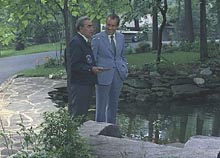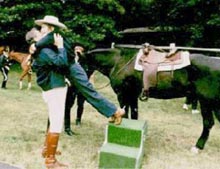Camp David | A History of the Presidential Retreat
Updated February 21, 2017 | Factmonster Staff 

History of Camp David
A brief history of the Presidential
mountain retreat and its famous guests
mountain retreat and its famous guests
 President Kennedy with JFK, Jr., at Camp David. (Source: John F. Kennedy Library) |
For more than 50 years now, when presidents have wanted privacy, they have sought the cool, secluded lodges and cabins of Camp David, the presidential retreat tucked away in Maryland's Catoctin Mountains.
Presidents have entertained visiting heads of state, such a former British Prime Minister Winston Churchill, conducted cabinet meetings, and briefed Congressional leaders at the retreat. The 1978 Middle East peace talks concluded with what have become known as the Camp David Accords. Yet few Americans know much about the place, considering its prominence.
Presidents have entertained visiting heads of state, such a former British Prime Minister Winston Churchill, conducted cabinet meetings, and briefed Congressional leaders at the retreat. The 1978 Middle East peace talks concluded with what have become known as the Camp David Accords. Yet few Americans know much about the place, considering its prominence.
Federal Summer Camp
It all started in 1935, when the Work Projects Administration, WPA, began building the Catoctin Recreational Demonstration Area Project near Thurmont, Maryland, as an example of creating parks from worn-out agricultural land.
Three years later, the area opened as a camp for federal government employees and their families. Known as Hi-Catoctin, the facility consisted of several small cabins, a dining hall, and a swimming pool. Covered with trees and 1,800 feet above sea level, the spot provided a cool respite from the near tropical humidity of the Washington, DC, area.
Meanwhile, immediately after America's entry into World War II, doctors for President Franklin Delano Roosevelt were urging the ailing president to find a place convenient to Washington, yet far enough away to escape the heat and political pressures of the city.
Three years later, the area opened as a camp for federal government employees and their families. Known as Hi-Catoctin, the facility consisted of several small cabins, a dining hall, and a swimming pool. Covered with trees and 1,800 feet above sea level, the spot provided a cool respite from the near tropical humidity of the Washington, DC, area.
Meanwhile, immediately after America's entry into World War II, doctors for President Franklin Delano Roosevelt were urging the ailing president to find a place convenient to Washington, yet far enough away to escape the heat and political pressures of the city.
 President Nixon with Soviet President Brezhnev standing beside the pool near Aspen. Brezhnev is wearing one of the windbreakers given to all Camp David guests. (Source: Nat'l Archives) |
The presidential yacht, USS Potomac, was out of the question because of heightened security considerations imposed by the war. After a search committee considered two other sites on Furnace Mountain on the Virginia side of the Potomac River below Harper's Ferry; and Shenandoah National Park, Virginia; Roosevelt toured two sites in the Catoctin Mountains.
He picked Hi-Catoctin, issuing a set of instructions on how the buildings should be remodeled and asking for the construction of a main lodge, which resembled the Roosevelt winter vacation home in Warm Springs, Georgia. The initial work cost $25,000. The camp was renamed the USS Shangri La, to follow up on the nautical connection, since many workers involved with the Potomac worked on the camp.
He picked Hi-Catoctin, issuing a set of instructions on how the buildings should be remodeled and asking for the construction of a main lodge, which resembled the Roosevelt winter vacation home in Warm Springs, Georgia. The initial work cost $25,000. The camp was renamed the USS Shangri La, to follow up on the nautical connection, since many workers involved with the Potomac worked on the camp.
Popular Presidential Choice
Since Roosevelt inaugurated Shangri-La with a three-day visit beginning July 18, 1942, all subsequent presidents have made extensive use of the mountain top retreat.
President Harry Truman did not visit Shangri-La often because Bess, his wife, felt it was dull. However, when they did visit, the Trumans enjoyed Shangri-La. Truman's favorite sport was walking and he spent long hours wandering the mountain trails with a secret service agent in tow.
President Harry Truman did not visit Shangri-La often because Bess, his wife, felt it was dull. However, when they did visit, the Trumans enjoyed Shangri-La. Truman's favorite sport was walking and he spent long hours wandering the mountain trails with a secret service agent in tow.
| RELATED LINKS |
| Camp David Accords Presidential Factfile |
Renamed Camp David
President Dwight Eisenhower changed the name of the retreat to Camp David in honor of his grandson, David Eisenhower. Although he and his wife, Mamie, tended to use Camp David for private relaxation, Eisenhower held the first cabinet meeting ever to take place there. He also hosted British Prime Minister Harold Macmillan and Soviet premier Nikita Khrushchev at Camp David.
President John Kennedy and his family visited the camp often, enjoying the horseback riding and other recreational opportunities. Kennedy also allowed White House staff and cabinet members to use Camp David when he was not there.
President John Kennedy and his family visited the camp often, enjoying the horseback riding and other recreational opportunities. Kennedy also allowed White House staff and cabinet members to use Camp David when he was not there.
President Lyndon Johnson held several important discussions with advisers on the Vietnam War, the crisis in the Dominican Republic, and other world events, at Camp David and hosted Prime Minister and Mrs. Harold Holt of Australia.
 The Reagans at Camp David in 1984. (Source: Ronald Reagan Library) |
Reconstruction and Improvements
President Richard Nixon used Camp David as much as his five predecessors combined. Nixon had several new buildings built in compatible architectural styles, but complete with modern conveniences. He held cabinet meetings, staff conferences, hosted foreign dignitaries, and family get togethers at Camp David.
President Gerald Ford rode around Camp David on a snowmobile, and hosted President and Mrs. Suharto of Indonesia.
President Jimmy Carter hosted the now famous Camp David Summit in 1978, between Egyptian President Anwar al-Sadat and Israeli Prime Minister Menachem Begin, and resulted in what are now known as the Camp David Accords establishing peace between Egypt and Israel. Carter also enjoyed fly-fishing.
President Ronald Reagan spent more time at Camp David than any other president. He liked horseback riding and working in the woodworking shop. Nancy Reagan worked on various landscaping improvements and updated decorating in some of the buildings. They also hosted British Prime Minister Margaret Thatcher.
President Gerald Ford rode around Camp David on a snowmobile, and hosted President and Mrs. Suharto of Indonesia.
President Jimmy Carter hosted the now famous Camp David Summit in 1978, between Egyptian President Anwar al-Sadat and Israeli Prime Minister Menachem Begin, and resulted in what are now known as the Camp David Accords establishing peace between Egypt and Israel. Carter also enjoyed fly-fishing.
President Ronald Reagan spent more time at Camp David than any other president. He liked horseback riding and working in the woodworking shop. Nancy Reagan worked on various landscaping improvements and updated decorating in some of the buildings. They also hosted British Prime Minister Margaret Thatcher.
A Camp David Wedding
President George Bush pitched horseshoes at Camp David, and welcomed Prince Charles to the retreat. In 1992, Bush's daughter, Dorothy "Doro" married Bobby Koch at Camp David, the first wedding ever performed there.
While President Bill Clinton visited Camp David infrequently in the early days of his administration, he did hold a week-long retreat on management with incoming administration officials in 1993. As his term progressed, however, Clinton spent more time at the retreat.
President George W. Bush is a frequent visitor to Camp David, and has spent hundreds of days there. He has entertained numerous foreign leaders there as well as friends and family.
While President Bill Clinton visited Camp David infrequently in the early days of his administration, he did hold a week-long retreat on management with incoming administration officials in 1993. As his term progressed, however, Clinton spent more time at the retreat.
President George W. Bush is a frequent visitor to Camp David, and has spent hundreds of days there. He has entertained numerous foreign leaders there as well as friends and family.
